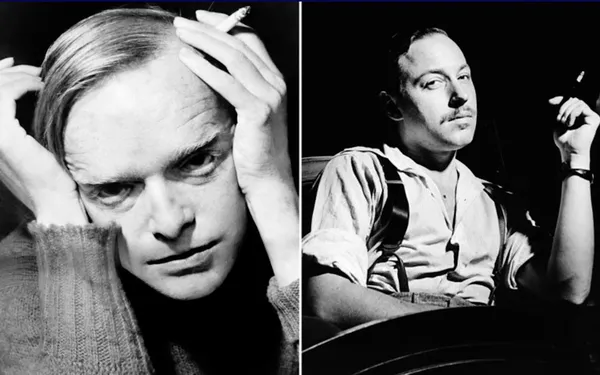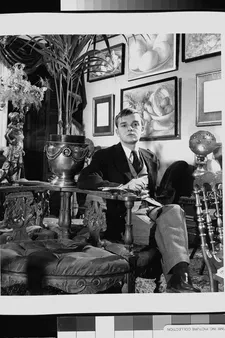In Lisa Immordino Vreeland’s universal and revealing Truman & Tennessee: An Intimate Conversation, Truman Capote notes that Toulouse-Lautrec, Oscar Wilde, Carl Van Vechten, Charles Baudelaire, Marcel Proust, and Cole Porter would have loved Studio 54, and Tennessee Williams states “I think the most moving writer to me that ever lived was Chekhov.” The director of Diana Vreeland: The Eye Has To Travel, Peggy Guggenheim: Art Addict, and Love, Cecil on Cecil Beaton captures the spirit of strong individuals of the 20th century like no other documentarian.
Structuring conversations between two friends, Capote and Williams, is very fruitful because the possible subjects are endless, the language is beautiful, and the depths are astounding. With archival footage from David Frost, Dick Cavett, and Tom Brokaw interviews, clips from movie versions of their writings, and the actors Jim Parsons (Capote) and Zachary Quinto (Williams) reading from letters and musings by two literary lions, we get to explore aspects of life and art that concern us all. There is Katharine Hepburn, flustered by revelations too painful to accept in The Glass Menagerie. There is Marlon Brando showing off his torso and male pride to Vivian Leigh in A Streetcar Named Desire.
And the more we see of Tennessee, the man - fragile, honest, taunting, trying to answer all the questions posed to him, the more it becomes clear how he contained the multitudes of all those characters in his plays, who are perpetually confronted with “the necessity to break tender bonds.” He is also Maggie, the cat, and Big Daddy in Cat on a Hot Tin Roof, and every single person in Suddenly Last Summer. With him we walk down the Spanish Steps in Rome. Capote, on the other hand, is more theatrical, guarded, controlled, and staged. He compares himself to an oyster, who “can’t help becoming obsessed by the pearl.” Both men invented themselves, changed their birth names, left the South and travelled, won Pulitzers, and became legends who altered the way we allow ourselves to view the world.
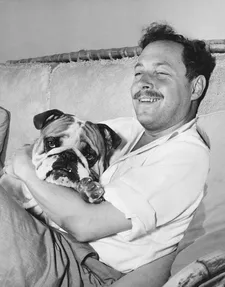 |
| Tennessee Williams with one of his bulldogs Photo: courtesy of Harry Ransom Center, The University of Texas at Austin |
From New York, after having recently returned from Europe, Lisa Immordino Vreeland joined me on Zoom for an in-depth conversation on Tennessee Williams, Truman Capote, and Truman & Tennessee: An Intimate Conversation.
Anne-Katrin Titze: Nice to see you again!
Lisa Immordino Vreeland: Hi, did we do Love, Cecil?
AKT: We did, in 2018. I was actually at your place for Love, Cecil. And Fischio [Lisa’s dog] was on my lap during the interview.
LIV: You know, Fischio actually died. And now we have Marcel. We have another boxer.
AKT: I’m so sorry to hear that. When we spoke in 2018, you already told me that you had plans on doing something on Truman Capote. Now seeing both of them together, I think works beautifully. What amazed me was how familiar I was with hearing, seeing Truman talk, and how unfamiliar I was with the footage of Tennessee, the person as opposed to his writing. How did combining the two come about?
LIV: Since you’re familiar with the fact that I’m typically pretty open about announcing what I’m working on, I really wanted to use the words of Truman Capote himself to tell not his life story, but to tell a story. I found out that there was another film being made, and my producer, Mark Lee, said, why don’t we throw Tennessee Williams in this? Of course I knew that they had a friendship, it just opened up so many possibilities in the way that story could go. And I was very familiar with Truman Capote because he has been lingering in all of my films because he was good friends with Mrs. Vreeland, he knew Peggy Guggenheim, and he was very close friends with Cecil Beaton. I have been in his archive, and have done a lot of research.
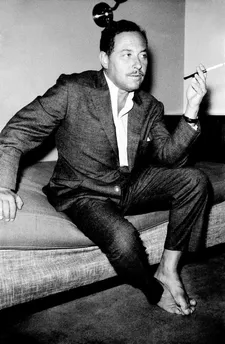 |
| Lisa Immordino Vreeland on Tennessee Williams: “There was a tenderness to him, an honesty to him.” Photo: Ara Guler, courtesy of Getty Images |
It was such a nice discovery for me to really get to know Tennessee Williams. I only knew his works, I didn’t know the person. Once we discovered the similarities in their personalities - the fact that they’re both Southern writers, they both came from homes where they were not really loved in any way. They weren’t shown love, they didn’t know how to give love. They both were children of alcoholics and they both suffered from addiction. They both were gay and they both had this creative force inside of them, as young children, this desire to create. I also loved the common ground that they had the desire to live in Europe also and did have lives in Europe. So we could go to Italy or somewhere else with the film. And we took advantage of all of that.
AKT: And they both had dogs, to stay with the theme.
LIV: And also the same kind of dogs! They had bulldogs.
AKT: English bulldogs, right!
LIV: Which is quite funny. I don’t always try to put dogs in the films, but it’s fun to be able to. What was so nice about the process of making the film was not only is the film steeped in the real literary aspect of their works, which we wanted to do, but it also gave us freedom, as this is not a biographical film, not a biopic. It’s just this intimate moment in their lives where we as the audience are dropping in on a conversation that they are having. It gave us freedom to go anywhere we wanted to go with the story.
AKT: Because it’s a conversation, you have clusters of topics, the same way a conversation flows. They start out with writing, which then turns to jealousy, or to travel, any different subject. It has a good flow to it.
LIV: Good, thank you! I wanted to be able to challenge myself by not having talking heads in the film, because a film always justifies itself if it needs talking heads, in my eyes. I’m not an expert. I felt Love, Cecil needed the talking heads, we also had such cool talking heads, we had voices from Tim Walker to [David] Bailey, people who knew him. In this case, I knew, even when the project was only a Capote project, I did not want talking heads. It was going to be their own words. My dream was to get Jim Parsons and Zach Quinto. It gave this whole new energy and creativity to the film by doing that.
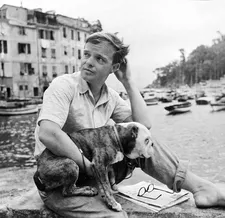 |
| Truman Capote with his bulldog Photo: courtesy of Getty Images |
AKT: I appreciated very much that when you show film clips, you give us both years, the year the film was made and the year of the play, or book, respectively. It adds another layer of time. You have that beautiful moment of Tennessee Williams talking about telling people to leave five minutes before the end of the movies that were made from his plays. Because the endings were changed often to the opposite. And also for Truman Capote, he brings up the casting for Holly Golightly - he wanted Marilyn Monroe and got Audrey Hepburn.
LIV: If you think of Breakfast at Tiffany’s with Marilyn Monroe versus Audrey Hepburn? A very different story would come out of it!
AKT: Totally!
LIV: The whole concept of “call girl” and having Marilyn Monroe there, she has a whole different type of physicality there. The idea we didn’t delve into was the censorship of a lot of Tennessee Williams’s plays and movies. In a film like this we wanted to balance them out. It would have been very easy for us to go into the Tennessee Williams side because nobody has really done that. He really does deserve a film.
AKT: Definitely.
LIV: Actually, something is being done. Peter Spears and Luca Guadagnino are producing the book. They are making a movie about [Christopher Castellani’s] Leading Men, which is about Tennessee Williams and Frank Merlo, his partner for so many years. So something is being done; I think it’s in production right now.
AKT: Sentences like “luxury is the wolf at the door!”
LIV: Language!
AKT: There are so many wonderful moments of language in the film. During the end credits we see manuscripts and notebooks and scribbled notes - all of that is gone today. How often do you look back at drafts on your computer? All the handwriting is more and more disappearing. Was that where you were going? Part of this lost world that you capture in all your documentaries?
LIV: I think you’re right. The end credits were designed by this amazing man, Sungtae Will Kim, who has worked on all of our films. It’s definitely a lost world that I’m completely in love with. Also in the end credits where we list all the archival material, it’s kind of obscene what we put in there, but we put everything in. It’s really important because there are people who are curious. We approach it in a very academic way, the same way as you said there were credits for: it was a play, and then a screenplay. We were very fortunate to have a Tennessee Williams expert, Thomas Keith, weigh in on it.
AKT: What astounded me was the intimacy of the television interviews. How far David Frost went with his questions! And get answers!
LIV: It was so nice! I really think there’s a lot of talent out there today, but all those interviews are so much on the surface. I’ve worked primarily with a lot of material from Dick Cavett and I actually adore him. He reacted so well to so many situations that were always in front of him, Cavett. He had pretty much everything thrown at him or punched at him. But there was something about the David Frost interviews. Cavett was always very straight and David Frost was just in there, touchy, and it really created a different type of ambiance. When we saw these interviews, we had Truman first and when we added Tennessee in the mix, we saw that we had another great interview. We could use it as launching pad for different subjects.
AKT: You made the perfect choice to connect to Studio 54 by using Truman’s quote about all the dead people who would have loved Studio 54 - Toulouse-Lautrec, Oscar Wilde, Carl Van Vechten, Baudelaire, Proust, and Cole Porter. Wow!
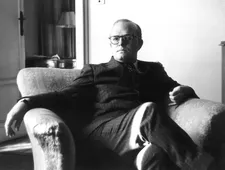 |
| Truman Capote on New York: “The only city-city - sinister but alive!” Photo: courtesy of Getty Images |
LIV: I love that, it was such a great quote. You know, it was definitely part of Truman’s world. It was not part of Tennessee’s world. He was not seeking celebrity as much. It’s not part of his history.
AKT: He seems to have been a much more private person.
LIV: I agree.
AKT: The story about his sister Rose!
LIV: Shocking! I didn’t know anything about that. Nor did I really know a lot about his life, so it was a discovery for me. Just shocking that they would have 65 electroshocks. When he died, he actually left everything to Rose. She had a nice long life after he died. Just shocking, shocking, shocking.
AKT: You are connecting it with a quote where he says “We are all victims of rape symbolically. Society rapes the individual.”
LIV: Heavy! But his words are just so beautiful and they penetrate your soul. I really did fall in love with his written word and also as a person. There was a tenderness to him, an honesty to him. There’s something slippery about Truman Capote’s personality. He was always a mise-en-scène of himself, while Tennessee was just there. Something I understood and connected with much more.
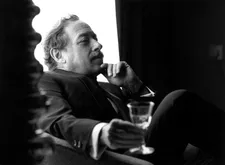 |
| Lisa Immordino Vreeland on Tennessee Williams: “Typically it looked like he was sipping on a little glass of white wine in these interviews.” Photo: Hulton Archive, courtesy of Getty Images |
AKT: That they both changed their names is another parallel.
LIV: That I forgot, I tend to forget about things.
AKT: These little tidbits add to it, also the most memorable books, written by someone else, for them: Moby Dick for Truman, somehow you think he is joking. What is his connection to whaling? Does he really like Melville?
LIV: No.
AKT: And then Tennessee and his Chekhov obsession - which makes sense.
LIV: It makes sense. It’s hard with Truman Capote to believe every word that came out of his mouth. He became such a caricature at a certain point in his life. It’s also part of my desire to make these films and talk about these people. The younger generation, they can just YouTube and Google up and they see these images or them talking on talk shows at a certain moment in their lives that they’re just destroyed, they’ve been drinking. And it’s not right. They actually deserve much more. That’s my feeling.
AKT: I agree with you.
LIV: That’s why it was so nice to focus in on a certain time, a certain relationship and be very precise about it, not having to deal with the breadth of their lives.
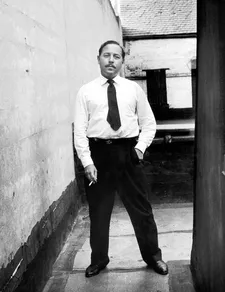 |
| Tennessee Williams in New York City Photo: Alfred Eisenstaedt, courtesy of Getty Images |
AKT: You see their mannerisms very well. There is Capote’s famous lisp, of course, but Tennessee Williams has this thing he does with his tongue between his teeth. That’s so fascinating. I don’t really know why.
LIV: No, no, I totally agree. I think that it actually becomes more accentuated the more he drinks. Typically it looked like he was sipping on a little glass of white wine in these interviews. I don’t know if he was taking pills sometimes. I know he definitely was taking something when he went to Dr. Feelgood. They both were taking things. There was something about him. I have to say, I find Tennessee very sexy. Something about his being and how he sat. There’s something about him being very comfortable in his persona. He suffered from depression, but he was comfortable with who he was with all of the ups and downs.
AKT: That The Glass Menagerie was the only play he would say was autobiographical?
LIV: No, they all were.
AKT: They all were! It’s so interesting to hear the statements both men are making and how you have to take them with a grain of salt. Stanley and Blanche, he says, are the two sides of everybody. He feels he is both.
LIV: Aren’t we lucky that he had the ability to give us all this? And make it okay to talk about all those things at a time when people weren’t thinking that way. He was provoking thought and feelings. He made it part of our vernacular of theatre. It’s great that he did all of this. That’s why I think it’s easy to fall for Tennessee is he just had this honest approach to his life.
AKT: It is Truman, I believe who says “What we most want is being held and told that everything is alright.” There’s a moment where he is most like Tennessee in the entire film.
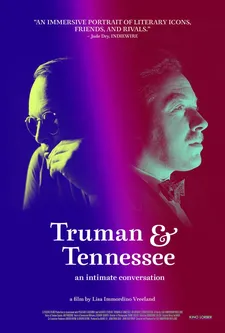 |
| Truman & Tennessee: An Intimate Conversation poster |
LIV: Yes, I have this theory that people who have grown up, who have not had a childhood where no great love and support has been given to them, they do have a broken path in life. And are always trying to make up for it. This is what I’m finding with a lot of the characters whose stories I’ve told and I think it’s really something that affects your whole life. This is the same thing. I mean, how do you overcome being locked up in hotel rooms by your mother, having a father who walks away? Being abandoned by both parents, actually.
AKT: Or having a mother who is Dr. Jekyll and Mr. Hyde!
LIV: Totally, yes, yes. And even in Tennessee’s case, he had parents who were there but not present as he wanted. I think this is a fundamental moment in your life, it really affects you in many ways.
AKT: Do you have another project coming up that you can talk about?
LIV: Well, I think I’m going to be doing Gertrude Stein.
AKT: Gertrude! Yes! Another great choice. I’m already looking forward to that one.
LIV: Thank you! It was nice to see you. Be well, be safe, etc.!
AKT: You too, in New York, “the only city-city - sinister but alive!” [as Truman says]
LIV: Exactly! Thank you. It was a great interview. It’s great to see you again.
Truman & Tennessee: An Intimate Conversation opens at Film Forum in New York on Friday, June 18.








